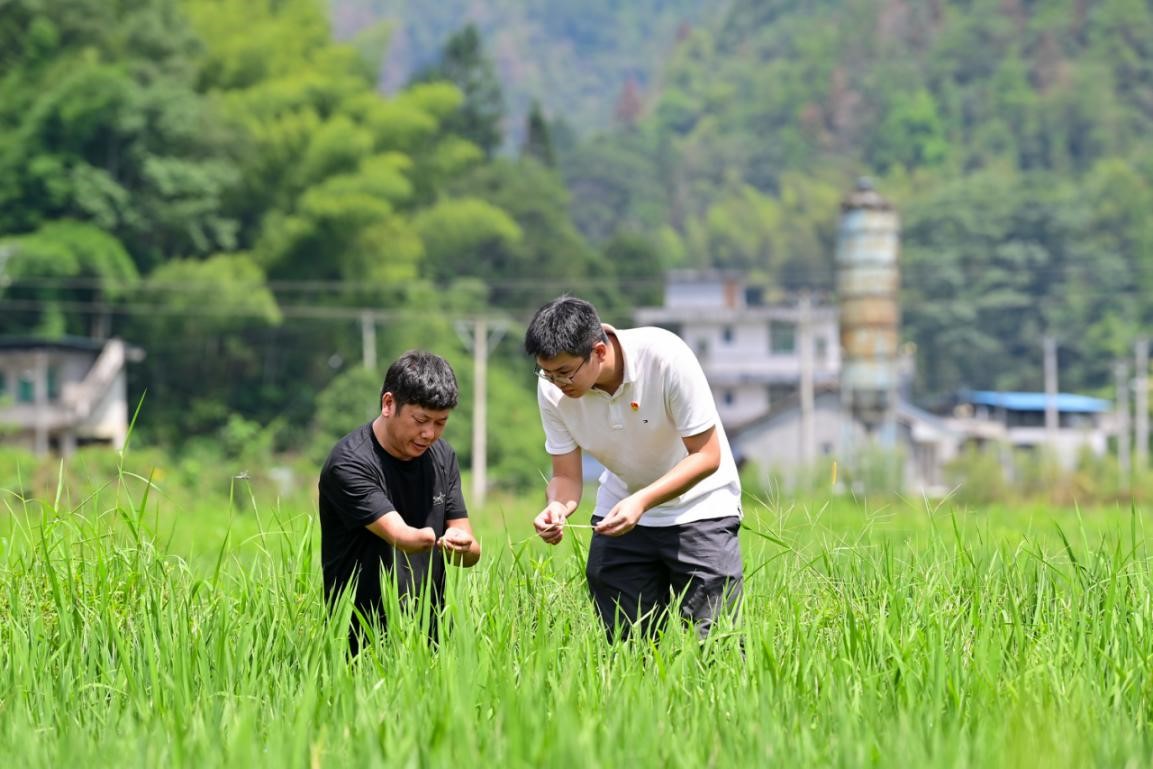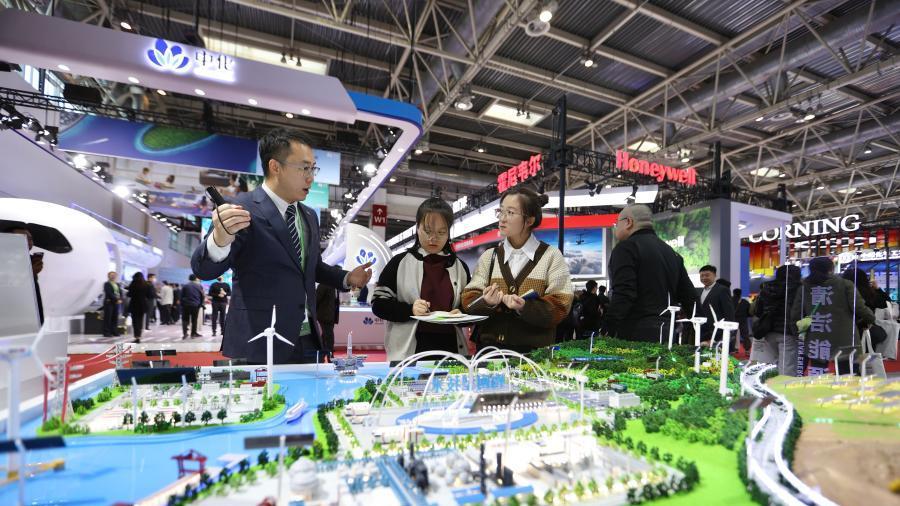China follows targeted strategy in poverty alleviation, eliminates root causes of poverty through development
Recently, the launch ceremony of the Portuguese edition of Chinese President Xi Jinping's book on poverty relief, "Up and Out of Poverty," and a seminar on the governance of China and Brazil were held in Rio de Janeiro, capital of Brazil.
Osmar Junior, executive secretary of Brazil's Ministry of Development and Social Assistance, Family and Fight against Hunger, noted that over 30 years ago, while working in Chinese impoverished areas, Xi led the local people in finding suitable ways out of poverty. His book "Up and Out of Poverty" holds even greater significance in a world of turbulence and transformation, added Junior.

A poverty alleviation official (right) instructs a local villager to deal with rice diseases and insect pests in Miwang village, Mawang township, Youyang Tujia and Miao autonomous county, southwest China's Chongqing municipality, Aug. 3, 2023. (People's Daily Online/Qiu Hongbin)
Junior noted that the book shares profound insights into national governance and social development, offering valuable lessons on poverty alleviation and sustainable development.
As the world's largest developing country, China has always given top priority to the fight against poverty in its national governance. It has lifted 800 million people out of poverty, setting an example for global poverty reduction.
In this process hailed as "the greatest leap to overcome poverty in history," China has blazed a poverty reduction trail and formed an anti-poverty theory with Chinese characteristics. Many of the experiences are worth learning from for other countries, which is why books like "Up and Out of Poverty" have become essential reading for many international dignitaries.
In the battle against poverty, the Communist Party of China (CPC) has fully leveraged its role in overall planning and coordinated the efforts of all sides, forming a magnificent force of unity and action to fight poverty.
China has included poverty alleviation in its Five-sphere Integrated Plan and the Four-pronged Comprehensive Strategy; worked to ensure that secretaries of Party committees at the provincial, city, county, township, and village levels tackled poverty alleviation as a major priority, and that all Party members were mobilized in the fight; and assigned 255,000 work teams and more than 3 million first secretaries and officials to villages nationwide, where they worked on the front lines of poverty reduction.
Uzbekistan has intensified efforts to reduce poverty in recent years, piloting China's anti-poverty experience in various regions across the country. Nearly 10,000 Uzbeks have participated in online training programs introducing China's experience and practices.
The country has achieved significant results in poverty reduction, creating a community-based anti-poverty system that involves the establishment of assistance registries for impoverished households, women and youth, which is a key component of anti-poverty efforts.
The ancient Chinese philosopher Han Fei Zi said, "The key to achieving your aspirations lies not in overcoming others, but in overcoming your own weaknesses." Similarly, to shake off poverty, it is essential to shake off the mindset of poverty.
China has remained committed to mobilizing the enthusiasm, initiative, and creativity of impoverished people so that they have the drive to lift themselves out of poverty.
Chairperson of the African Union Commission Moussa Faki Mahamat noted that he felt a strong sense of self-reliance in China's poverty alleviation endeavors, which he believes is the fundamental principle behind China's fascinating achievements in poverty reduction.
A targeted approach is the crux of the fight against poverty. China followed a targeted and development-driven strategy in poverty alleviation, under which development is fundamental to eliminate the root causes of poverty.
China adopted a set of targeted policies tailored to local conditions, such as setting up a national registration system and assigning officials to villages to identify the targets of poverty alleviation and determine who to help; establishing a poverty exit mechanism and giving counties a five-year period of grace from the day they emerged from poverty to make clear how to help, how to apply an exit mechanism for those who have emerged from poverty, and how to ensure that people do not return to poverty.
China has launched five key measures through which people would be lifted out of poverty, namely new economic activities, relocation from uninhabitable areas, recompense for eco-protection, education, and social assistance for basic needs. Besides, China has set standards in six areas to ensure the precision of work: identifying the poor accurately, arranging targeted programs, utilizing capital efficiently, taking household-based measures, dispatching first Party secretaries based on village conditions, and achieving the set goals.
Targeted poverty alleviation has proved to be China's "magic weapon" for winning the battle against poverty, and a major innovation in the theory and practice of poverty reduction, greatly enriching and expanding the pathways for poverty reduction for humanity.
Drawing on China's targeted poverty alleviation approach, Khon Kaen province in Thailand has achieved tangible results in poverty reduction. A local official said that China not only allows the world to understand the importance of targeted poverty alleviation and see the possibility of poverty eradication, but also provides the courage and experience to address poverty issues.
In December 2018, the 73rd session of the UN General Assembly adopted the first-ever resolution addressing poverty eradication in rural areas, which contains the Chinese concept of "targeted poverty alleviation."
UN Secretary-General Antonio Guterres spoke highly of the Chinese experience, saying targeted poverty reduction strategies are the only way to reach those farthest behind and achieve the ambitious targets set out in the 2030 Agenda for Sustainable Development. China's experience can provide valuable insights to other developing countries, he added.
Poverty is not predestined, nor is it unconquerable. China's experience in poverty alleviation indicates that with strong will and determination, as well as practical action, one can make steady progress towards overcoming poverty.
China has joined the Global Alliance against Hunger and Poverty. It stands ready to continue carrying out and supporting international cooperation in poverty reduction. Together with all parties, China is committed to building a world of common prosperity and free of poverty.
Photos
Related Stories
- China follows people-centered approach, turns visions into reality
- China's success in combating poverty offers experience to world
- Up and out of poverty
- Global visitors draw inspiration in poverty alleviation from China's ethnic village
- Chinese premier stresses consolidating achievements in poverty alleviation
Copyright © 2024 People's Daily Online. All Rights Reserved.









